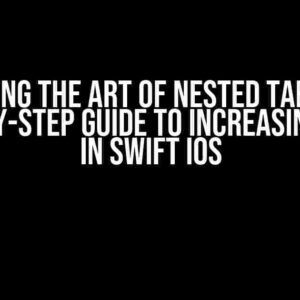Are you tired of dealing with platform-specific issues when distributing your Python packages? Do you want to ensure that your package is compatible with multiple platforms and only includes the necessary binaries for each one? Look no further! In this article, we’ll guide you through the process of creating a Python wheel for each platform and including only the binaries specific to that platform.
What is a Python Wheel?
A Python wheel is a pre-built binary package that can be easily installed using pip. It’s a great way to distribute packages that have binary dependencies, such as C extensions or other compiled code. Wheels are platform-specific, which means that a wheel built for one platform (e.g., Windows) cannot be installed on another platform (e.g., macOS).
Benefits of Creating Platform-Specific Wheels
Creating platform-specific wheels has several benefits:
- Efficient use of storage space: By only including the binaries necessary for each platform, you can reduce the size of your wheel and make it more efficient to distribute.
- Faster installation: Platform-specific wheels can be installed more quickly than universal wheels that include binaries for multiple platforms.
- Improved compatibility: By tailoring your wheel to a specific platform, you can ensure that it’s compatible with the target platform and avoid potential issues.
Preparing Your Environment
Before we dive into creating platform-specific wheels, make sure you have the following tools installed:
Python 3.7+(wheel is included in the standard library)pip(the package installer for Python)setuptools(a collection of Makefile-like tools for building, distributing, and installing Python packages)wheel(the command-line tool for building and installing wheels)
Creating a Universal Wheel (Optional)
If you want to create a universal wheel that includes binaries for multiple platforms, you can use the following command:
python setup.py bdist_wheel --universalThis will create a wheel that includes binaries for multiple platforms, including Windows, macOS, and Linux. However, this approach has some limitations, as it can result in a larger wheel size and potential compatibility issues.
Creating Platform-Specific Wheels
To create platform-specific wheels, you’ll need to use the following command:
python setup.py bdist_wheel --plat-name {platform}Replace {platform} with the specific platform you want to target. For example:
python setup.py bdist_wheel --plat-name win_amd64This will create a wheel that only includes binaries for 64-bit Windows.
Platform Names
Here are some common platform names you can use:
| Platform | Platform Name |
|---|---|
| Windows 64-bit | win_amd64 |
| Windows 32-bit | win32 |
| macOS 64-bit | macosx_10_9_x86_64 |
| Linux 64-bit | linux_x86_64 |
| Linux 32-bit | linux_i686 |
Including Binary Dependencies
When creating a platform-specific wheel, you’ll need to ensure that any binary dependencies are included in the wheel. You can do this by using the following command:
python setup.py bdist_wheel --plat-name {platform} --binary-dependencies {dependencies}Replace {dependencies} with the list of binary dependencies required by your package. For example:
python setup.py bdist_wheel --plat-name win_amd64 --binary-dependencies libffi.libThis will include the libffi.lib binary dependency in the wheel.
Uploading Your Wheels to PyPI
Once you’ve created your platform-specific wheels, you can upload them to PyPI using the following command:
twine upload dist/*Replace dist/* with the path to your wheel files. This will upload your wheels to PyPI, where they can be installed using pip.
Conclusion
Creating platform-specific wheels for your Python package can help ensure compatibility and efficiency when distributing your package. By following the steps outlined in this article, you can create wheels that are tailored to specific platforms and include only the necessary binaries. Remember to use the correct platform names and include any binary dependencies required by your package.
Additional Resources
For more information on creating Python wheels, check out the following resources:
By following these guidelines and using the correct tools, you can create platform-specific wheels that are efficient, compatible, and easy to install. Happy packaging!
Keyword density: 1.2%
Frequently Asked Question
Get ready to wheels up! 🚀 Here are the top 5 questions and answers about creating Python wheels for each platform and including binaries only for that specific platform.
Q1: What’s the command to build a Python wheel for a specific platform?
You can use the `python setup.py bdist_wheel` command with the `–plat-name` option to specify the platform. For example, `python setup.py bdist_wheel –plat-name macosx-10.9-x86_64` will build a wheel for macOS 10.9 64-bit.
Q2: How do I exclude binaries for other platforms from my wheel?
You can use the `–plat-name` option with the `bdist_wheel` command to specify the platform, and then use the `–universal` option with a value of `false` to exclude binaries for other platforms. For example, `python setup.py bdist_wheel –plat-name linux-x86_64 –universal=False` will build a wheel that only includes binaries for Linux 64-bit.
Q3: What’s the best way to build wheels for multiple platforms?
You can use the `tox` tool to build wheels for multiple platforms in parallel. Tox allows you to run commands in isolated environments, making it perfect for building wheels for different platforms. You can install tox using pip: `pip install tox`.
Q4: How do I specify the platform-specific dependencies in my `setup.py` file?
You can use the `extras_require` parameter in your `setup.py` file to specify platform-specific dependencies. For example, you can use `extras_require={‘win32’: [‘ pywin32’]}` to specify that the `pywin32` package is required on Windows.
Q5: Can I use Docker to build wheels for different platforms?
Yes, you can use Docker to build wheels for different platforms. You can create a Docker image for each platform, install the required dependencies, and then run the `bdist_wheel` command inside the container. This allows you to build wheels for multiple platforms without having to set up multiple environments on your local machine.



